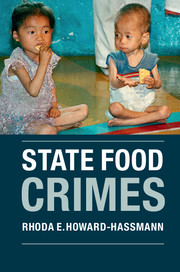4 - North Korea
from Part II - Contemporary Case Studies
Published online by Cambridge University Press: 05 August 2016
Summary
One purpose of the case studies chosen for this book is to illustrate the degrees of faminogenesis proposed by Marcus. Some regimes, Marcus argues, intentionally impose famine and malnutrition, while others recklessly continue policies that undermine their population's access to food, and yet others are indifferent to starvation and malnutrition or incompetent to correct such problems (Marcus 2003, 246–47). North Korea is an example of state-induced famine, at best recklessly but possibly intentionally caused and perpetuated. From the 1990s through the early years of the twenty-first century, government policies caused hundreds of thousands, if not over a million North Koreans to die of starvation, while many others suffered severe malnutrition. A subset of North Koreans, those imprisoned in a network of prison camps, was even more likely to starve than the general population. This chapter explains the policies behind the famine and malnutrition.
Theoretically, the question is whether North Korean policies constituted faminogenesis. Practically, the question is how North Korea could be persuaded to ameliorate its policies and what, if anything, could be done under international law to punish perpetrators of faminogenesis and assist both those North Koreans who stayed in the country and those who fled. These latter questions will be addressed in Part III, Chapters 8 and 9.
Historical Background
A state severely isolated from the international community, North Korea is a creation of the Cold War. From 1910 to 1945, the Korean Peninsula was colonized by the Japanese. At the end of WWII, the defeated Japanese withdrew from their colony and the Americans and Soviets agreed that Korea would be split at the 38th parallel, a line arbitrarily chosen as it roughly divided the ancient kingdom into two equal parts. Kim Il Sung, purportedly a former guerilla leader against the Japanese in Manchuria (Hwang 2010, 185), was chosen by the Soviet Union to lead the North. In 1950 he attacked the South, anticipating an easy victory. The United States and other countries came to the South's defense, with United Nations approval, leading newly Communist China to enter the war on the side of the North.
- Type
- Chapter
- Information
- State Food Crimes , pp. 61 - 77Publisher: Cambridge University PressPrint publication year: 2016



